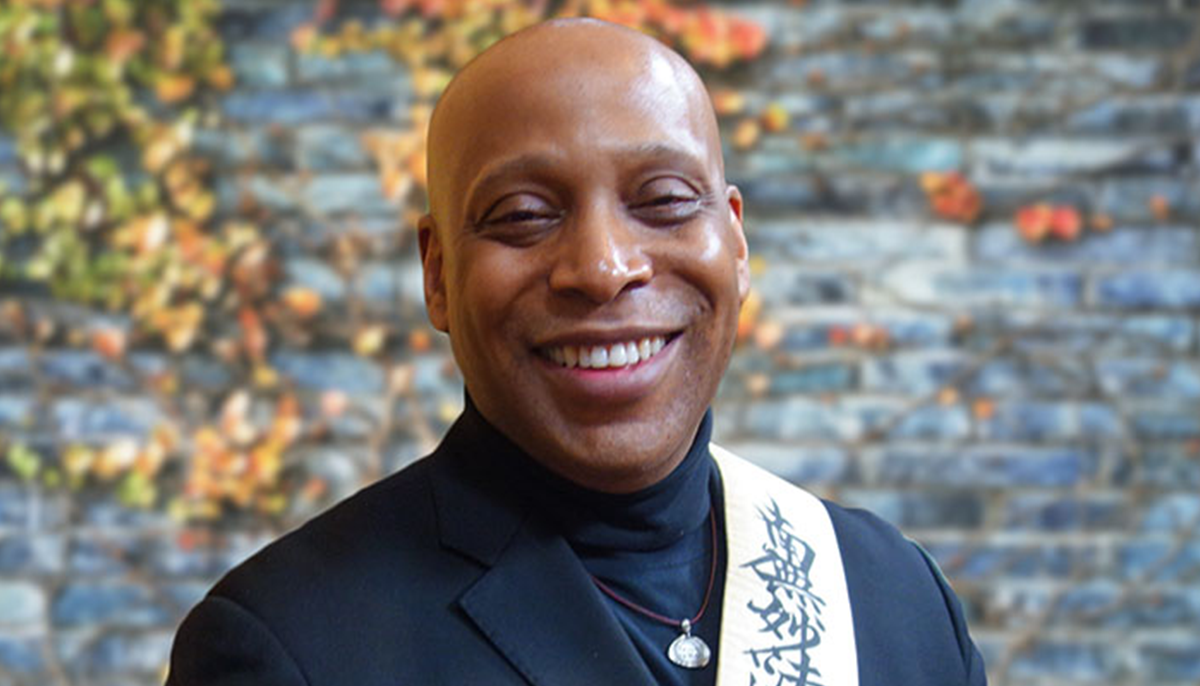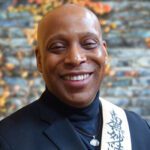How did your family inform your spiritual path?
I’ve been practicing Buddhism since I was sixteen or seventeen, after my mother was introduced to Buddhism in 1976.
My family is religious. My grandparents on both sides were Christian ministers. My great-grandmother founded five Christian churches in New York City. All my great-aunts and my maternal grandmother were Worldwide Evangelists. My paternal grandmother was a New Thought Unity minister.
My aunt Effie was a Transcendental Meditation trainer and one of a few Black women who traveled with Maharishi Mahesh Yogi in the 1960s. She introduced my mother to Buddhism. As my mother would say, “There’s no coincidence in the universe.”
How would you describe your practice?
I always think of myself as a practitioner. I’m part of the stream of ancient people who strove to express their spirituality to survive. I am the fruit of the unarticulated dream of slaves—the dream that I might have freedom to live. As a result, my practice is not just mine alone, but the practice of all my ancestors as well. I’m fortunate that my Buddhist community, Rissho Kosei Kai, recognizes ancestors, so I’m very happy to include that as part of my practice as a skillful means.
At the end of the day, what’s important is making sure you develop your spirituality and mindfulness on the path that you are on, regardless of your tradition or faith.
At the end of the day, our practice is for ourselves and for others. If you practice in a society that struggles with the legacies of what many identify as, say, white supremacy, the only way you can break that down is to recontextualize it, not dualistically demonize folks. Restructure that whole poison, and change that poison into medicine.
It’s simple. If you bang the drum, which drum are you using? The drum can be used to herald war and killing, or it can be the drum that sounds the great dharma of peace and compassion that transforms people. The choice is up to us.
Describe your work with the Buddhist Council of New York (BCNY).
The Buddhist Council of New York is a confederation of eighty to ninety different traditions and communities in the New York City area, representing over a million members. I became involved with the Buddhist Council of New York when I was appointed by my community, Rissho Kosei Kai, to do area outreach.
I worked closely with former BCNY president Rev. T. Kenjitsu Nakagaki. I didn’t want to become the BCNY president, but people thought I had high respect for various traditions, so I became president. Now, I’m happily vice president under the direction of the Reverend Doyeon Park, who’s a tremendous leader and a great friend.
During my time as the BCNY president, we had Covid, Black Lives Matter, shootings, random violence. Being a recovering attorney and a college professor at Brooklyn College, I got involved. Being “involved” was far more serious than I initially realized. I was shocked that at times I received death threats at my house, all because the council was organizing for peace. This was happening now, in New York City, and not the 1950s somewhere in the Deep South!
As president of the council, I represented many varied Buddhist traditions, so I’m mindful of underlying tensions in the Buddhist community that might prohibit some traditions from participating in all public activities. For example, a few of our traditions and temples include many people who are undocumented persons. When Trump changed immigration policies, and there was some uncertainty on how undocumented individuals were going to be dealt with, the council attempted to work in concert with other groups to help these vulnerable individuals protect themselves, as well as educating the whole New York Buddhist community on what we need to do collectively.
The fact is that Asian communities often feel targeted, which they often are, so they rightly want to stay under the radar. As the president of the council and as a Rissho Kosei Kai member, I encouraged us to act. Let’s face it—not everything is always going to appear safe in life, but if we truly trust in our Buddhist path, there are things that go beyond our physical life and safety.
Why is interfaith dialogue important to you?
In Rissho Kosei Kai, all Buddhist practices and all faith traditions at their core are to be embraced as being on the path of a sincere flowering of human worth and dignity. All humanity, in whatever its expression, possesses buddhanature. This is the reason why Rissho Kosei Kai practitioners do a lot of interfaith work. Our approach goes beyond mere tolerance to one of embracing the other.
This flexibility can be seen in early Buddhism. For example, there were high-level Jain practitioners during the Buddha’s time who wanted to follow him. The Buddha said essentially, “Hey, you can follow me while you continue to do Jain rituals and practice.” The Buddha wasn’t about “me, me, me” but about others and their fundamental liberation and happiness.
At the end of the day, what’s important is making sure you develop your spirituality and mindfulness on the path that you are on, regardless of your tradition or faith.
You said you’re “a recovering attorney.” Tell us more about that.
I had a company in the late 1980s housing homeless women and children in New York City and South Philadelphia. The corruption was so great, with people expecting bribes, that it propelled me toward law school.
I became a corporate lawyer working in large law firms. My ultimate objective was to figure out how homeless women and children could be supported to be self-sufficient. My goal was to make big banks work with community-based organizations like my own, and quite frankly they had no interest in doing this. That said, while I worked at large firms, I also had the privilege to work for the Women’s World Banking, which gave microloans, so it wasn’t all bad.
Then during the attacks on 9/11, I walked out of my building and over the Manhattan Bridge, and I realized, “I could die here, and people like me might never be served.” After that I started a law firm with two Black women. I saw that economic systems have a substructure behind them that do not allow people to easily remove themselves from shackles of which they are not even aware.
What advice do you give Black Buddhists on leadership?
If you recognize that you have something of great value to give—your compassion, your joy, your kindness—then you can talk to people about their suffering and embrace other people and groups, while still not wavering in your truth.
I think Black people have been conditioned to think we haven’t succeeded. We have a narrative that has disempowered us from our greatness. But as my father often said, I’m a descendant of the strongest of the strong. The generation before us did succeed: they ended Jim Crow, they got equal housing, they made society recognize itself.
Capitalistic accumulation of money and things is not the only barometer of success. We must take back our power of agency and deconstruct the internal and external narratives that are disempowering us.
This article is from the March 2024 issue of Lion’s Roar magazine.

